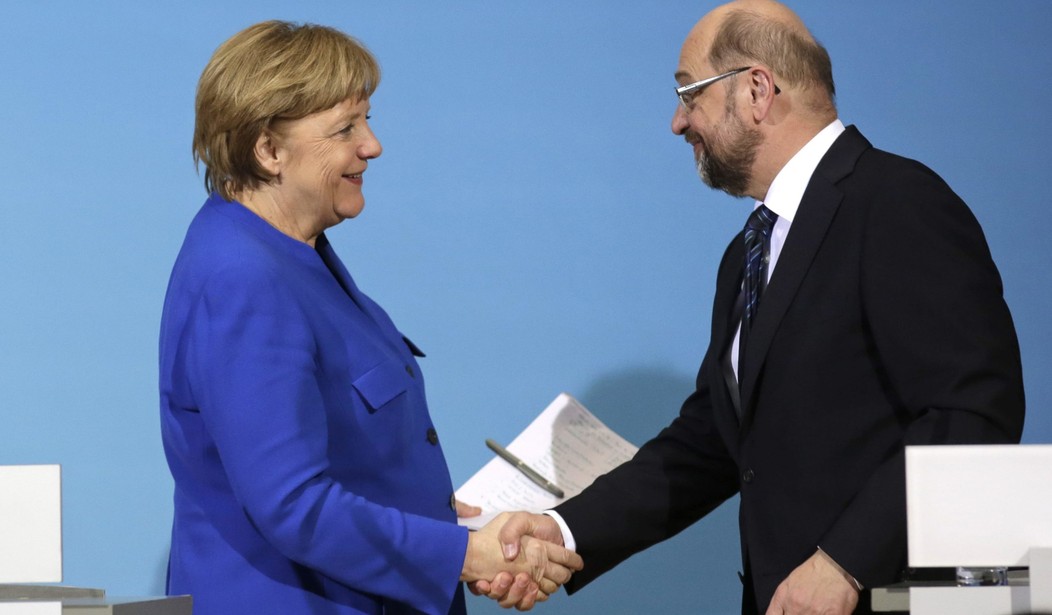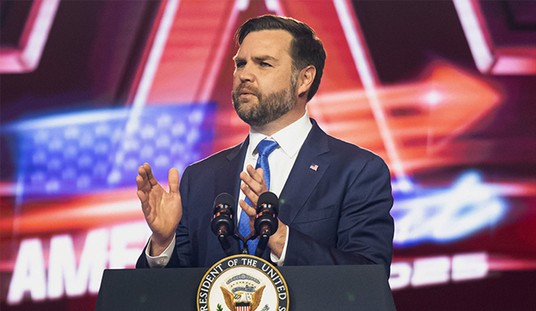Leftist Bloomberg.com is extremely happy with the results of the coalition talks between Angela Merkel’s CDU and Martin Schulz’s SPD parties:
We may have no idea which shape the eurozone will take in the future, but we know one thing for sure: Any change to the structure of the currency union will need to be agreed to by Germany, the bloc’s biggest economy and the largest contributor to the EU budget.
The section on Europe in the draft coalition agreement between the Christian-Democrats and the Social-Democrats is, as far as Bloomberg is concerned, very positive. “Germany’s largest parties seem keen to go further on the road to eurozone integration than ever before.”
Although this is decidedly not what European voters want, it is the establishment left’s Great Dream. And so, Bloomberg is celebrating:
To understand why, let’s take a short step back into the recent past. Angela Merkel, who is seeking a fourth term as chancellor, spent much of the autumn negotiating a three-way deal with the Greens and the Free Democratic Party. The FDP, led by Christian Lindner, had drawn a red line at the idea that the eurozone should have a budget and vehemently opposed transfers across the currency union.
The talks collapsed, prompting Merkel to negotiate with the SPD’s leader Martin Schulz, a committed federalist who has been president of the European Parliament. This was excellent news for anyone who believes the currency union has to move closer together in order to thrive: Germany made important concessions at the height of the sovereign debt crisis, for example agreeing to set up a euro-zone rescue fund (the European Stability Mechanism). However, in the last few years, Berlin has been resistant to further risk-sharing, insisting that governments should first reduce their budget deficits and prompt banks to clean up their balance sheets. A three-way deal with the FDP and the Greens would have meant more of the same.
Last week’s position paper is, Bloomberg continues, “a quantum leap compared to Lindner’s intention.” Sadly, that’s not an exaggeration. The paper talks about the need to “emphasize specific budgetary resources for economic stabilization, social convergence, and support for structural reforms in the eurozone,” and even about setting up “an investment budget for the eurozone.” This fund could be managed by the European Parliament. This is the same Parliament only very few Europeans actually take the time to vote for, believing it to be either an irrelevant institution or a “too far from my bed” show.
The European Commission — which is basically the EU’s unelected cabinet — is undoubtedly happy with the German position paper. The EC has already said it wants to create a “stabilization fund” to help “struggling” European economies. It goes without saying that prosperous EU member states, like the Netherlands and Germany, will again be forced to pay for such a fund.
Voters in those countries will not be happy with these results. The Dutch government understands that all too well, which is why it has made it clear that it opposes systematic fiscal transfers in the eurozone. Sadly, however, the Netherlands is a small country. If Germany wants to create the United States of Europe, the Netherlands (and similar countries like Denmark) is powerless to prevent it.
In the end, they’ll be forced to do whatever Germany wants — especially if Germany has the support of France, which clearly is the case with regards to the creation of a “fiscal union.” As Merkel and Schulz write in their paper:
The renewal of the EU will only succeed when Germany and France act together with combined strength. As a result, we want to renew and strengthen the French-German cooperation. A new Élysée Treaty is a first and important step to this end. In particular, Germany and France should be an engine of innovation and will put this into effect through projects such as research into artificial intelligence. We want to develop common positions on possibly all important questions in European and international politics and we want to proceed in areas in which the EU with 27 Member States cannot act.
The worst part of Germany’s new plans for Europe is that the average Western European voter doesn’t actually support them. The Danish, the Dutch, and the Germans don’t feel “European,” but Danish, Dutch, or German. There is no such thing as a common European identity. The only people who believe there is such a thing are europhiles like Schulz and Bloomberg. Actual Europeans feel quite different about their identities and their right to self-determination.
In any case, it’s clear that the Grand European Project will continue despite the growing uproar.
Will this relentless push for a United States of Europe eventually push too hard? Will it create so much outrage that entire governments are toppled, or will the Brussels elites succeed in wiping out individual European nation-states?









Join the conversation as a VIP Member